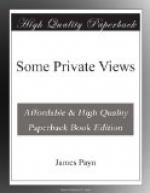On the other hand, literary taste would, one would think, be the last thing to vary with our physical condition; yet those who have had long illnesses know better, and will, I am sure, bear me out in the assertion that there are such things as sick books. I do not, of course, speak of devotional works. I am picturing the poor man when he is getting well after a long bout of illness; his mind clear, but inert; his limbs painless, but so languid that they hardly seem to belong to him; and when he regards their attenuated proportions with the same sort of feeble interest that is evoked by eggshell china—they are not useful, still it would be a pity if they broke.
Then it is that one feels a loathing of the strong meats of literature, and a liking for its milk diet. As to metaphysics, one has had enough and to spare of them when one was delirious; while the ’Fairy Tales of Science’ do not strike one just then as being quite so fairylike as the poet represents them. As to science, indeed, there is but one thing clear to us, namely, that the theory of evolution is a mistake; for though one’s getting better at all is undoubtedly a proof of the survival of the fittest, we are well convinced that we have retrograded from what we were. It would puzzle Darwin himself to fix our position exactly, but though we lack the tenacity, and especially the colour, of the sea-anemone, we seem to be there or thereabouts in the scale of humanity. When last prostrated by rheumatic fever, or its remedies, I remember, indeed, to have been inclined to mathematics. When very ill I had suffered agonies in my dreams from the persecutions of an impossible quantity, and perhaps the association of ideas suggested, as I slowly gathered strength, a little problem in statics. It had been taught me by my dear tutor at Cambridge, whom undergraduates have long ceased to trouble, as a proof of the pathos that dwells in figures; and I kept repeating it to myself, with the letters all misplaced, till I became exhausted by tears and emotion.
As a general rule, however, even mathematics fail to interest the convalescent. ‘Man delights not him; no, nor woman neither;’ but Literature, if light in the hand, and always provided that he has his back to the window, is a pleasure to him only next to that of his new found appetite and his first chicken. His taste ’has suffered a sick change,’ but that by no means implies it has deteriorated. On the contrary, his critical faculty has fled (which is surely an immense advantage), while he has recovered much of that power of appreciation which rarely abides with us to maturity. He is not on the outlook for mistakes, slips of style, anachronisms; he derives no pleasure from the discovery of spots in the sun, but is content to bask in the rays of it. He does not necessarily return to the favourites of his youth, though he has a tendency that way, but the shackles of convention have slipped away from him with his flesh, and he reads what he likes, and




